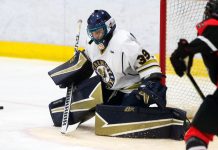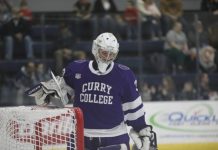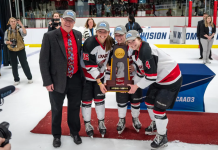I still can’t get that play out of my head.
The sight of it.
The sound of it.
The result of it.
The violent and illegal hit that Denver’s Geoff Paukovich leveled against North Dakota’s Robbie Bina in the WCHA Tournament in St. Paul, Minn., last week has resonated all across our game.
I worry most about Bina, who had to be carried off the ice on a stretcher, and later had surgery to repair broken vertebrae in his neck. While the prognosis for “full recovery” may be good, he may never play hockey again.
I also worry about Paukovich, who according to media reports, is devastated by his actions. He is a talented player who has already been at the center of some difficult controversy in his young life.
And I worry about our game, which always takes a hit when players get badly hurt.
There are no winners here, only losers.
My personal reaction to this incident reflects several levels of assessment — as an alumnus of one of the schools involved, as a hockey writer and booster of our game, and most of all, simply as a human being.
As a Denver alumnus, my first instinct was to look at this incident through the eyes of my own bond to my alma mater. This incident deeply hurts a program I care about. I was embarrassed and angered by what I saw Paukovich do, and I know many other Denver fans had similar reactions. We have a great deal of pride in our school, and we hate to see it stained by a senseless act like this. But frankly, my hopes for Denver getting though this are a much lower priority than my other aspects of concern.
My next level of assessment was as a hockey writer and as a lifetime booster of our great game. In this regard, I look out for the well-being of college hockey. I’m hoping that the right punishments were made and that the situation was handled properly. Referee Don Adam assessed only a two-minute minor penalty on the play, and almost everybody who saw it would agree that in hindsight, it was not nearly enough of an on-ice punishment.
After the game, the WCHA Tournament Committee suspended Paukovich for the WCHA Championship Game, after reviewing the play on video. Was that enough? Missing a League Championship Game against an arch rival is a very big deal, and doesn’t happen every day. But broken necks don’t happen every day either.
This week, Denver coach George Gwozdecky served Paukovich with an additional team suspension for at least Denver’s first NCAA game against Bemidji State.
Suspending any player (especially an important player) for an NCAA game is a much bigger deal than suspending a player for a regular season game. Denver is now in win-or-go-home territory, and the entire program has been working all season to get to this point. Thousands of hours of sweat, countless hours of mental anguish and many dollars in investment have been poured into the effort to get this team to this critical moment in time. The NCAA game against Bemidji State is the biggest game of the year so far for Denver, and to voluntarily take a key cog out of any team takes some guts.
We’ve seen such guts from Gwozdecky before. Last year, Gwozdecky suspended then-senior forward (and NCAA tourney leading scorer) Lukas Dora for the NCAA Championship Game for breaking team rules. It was a move that paid off. Denver won the NCAA Championship, and Gwozdecky was lauded by many as a man of principle.
Gwozdecky’s suspension of Paukovich in this case is also the right thing to do. Gwozdecky is paid to win hockey games, especially big playoff games. But he is also paid to develop young men. He did the right thing by putting that development above putting his best possible team on the ice.
Finally, when I assess this as a human being, all hockey issues pale in comparison to what happened to Bina, who has a broken neck and may never play hockey again. Bina has spent much of his young life working to be an elite hockey player, and may have had that dream taken away by a stupid and senseless act. We all want to reach out to Robbie and make it go away. But it won’t go away anytime soon. We can’t change what happened, but we can certainly use this as an opportunity to re-assess how we handle future situations like this.
We can put more teeth into the playing rules, making more severe punishments for checking from behind and boarding calls. We’ve come a long way in this regard already, as “Zero-Tolerance” has become a point of emphasis in the rule-book, but more could be done. North Dakota fans and others who clamor for a Hammurabic “eye for an eye” approach to justice would like to see Paukovich suspended until Bina plays again. They may have a point. But our society, and college hockey in particular, does necessarily run on Hammurabic principles. And whether that is a good thing is a moral/philosophical argument that should probably be reserved for those more philosophically inclined than yours truly.
What I do know is that all of us with an interest in the game have been touched by this incident. We hope that it will become a catalyst both for improving the way such incidents are penalized and for eradicating them completely in the future. At the same time, we must be mindful of a realistic assessment of pre-meditation within the on-ice world of split-second reactions in an often-dangerous sport. At the very least, the commissioners and coaches should develop a task force to study the issue and recommend improvements. At least then, Bina’s personal loss may yield a greater gift to the game than any player could give us on the ice.
But task forces and improved hockey safety do not compensate for the immediate pain of this saga. Paukovich will likely recall Bina being carried off the ice every day for the rest of his life, and that is a penalty far greater than any suspension he might receive. And certainly Bina will not easily forget the missing vertebra in his neck, and it remains to be seen if he will ever play again.
One thing is certain — both young men will never be the same as they were before that hit.
And perhaps college hockey will never be the same either.
Tom Douglis is former editor of College Hockey Magazine and former PR coordinator for USA Hockey.


